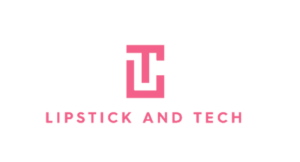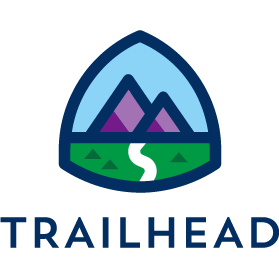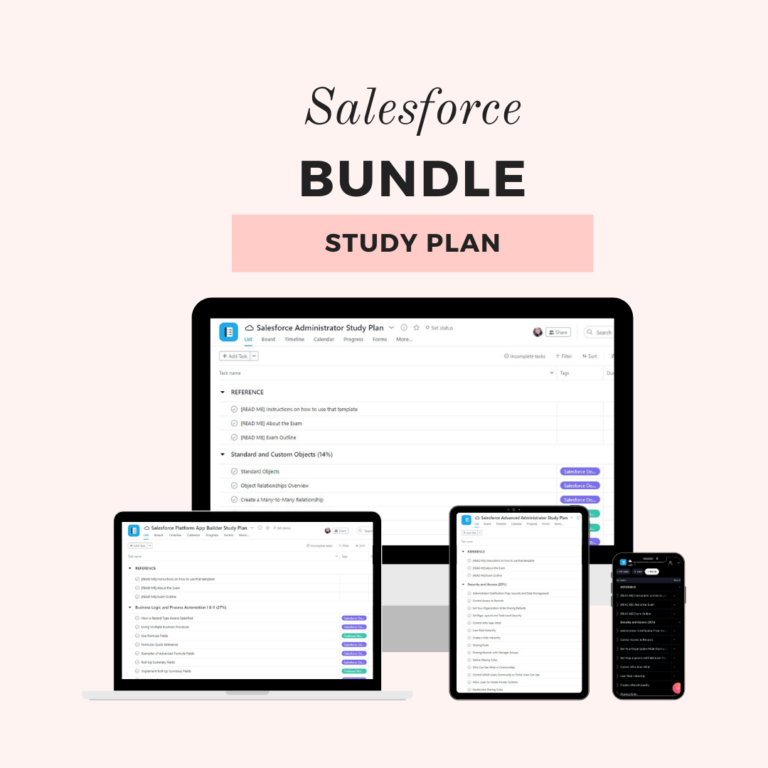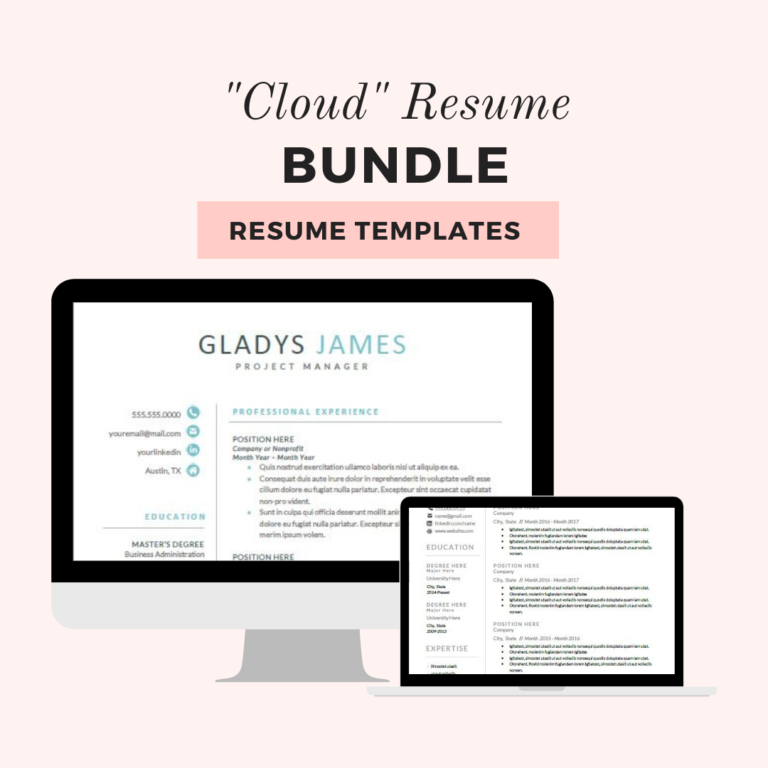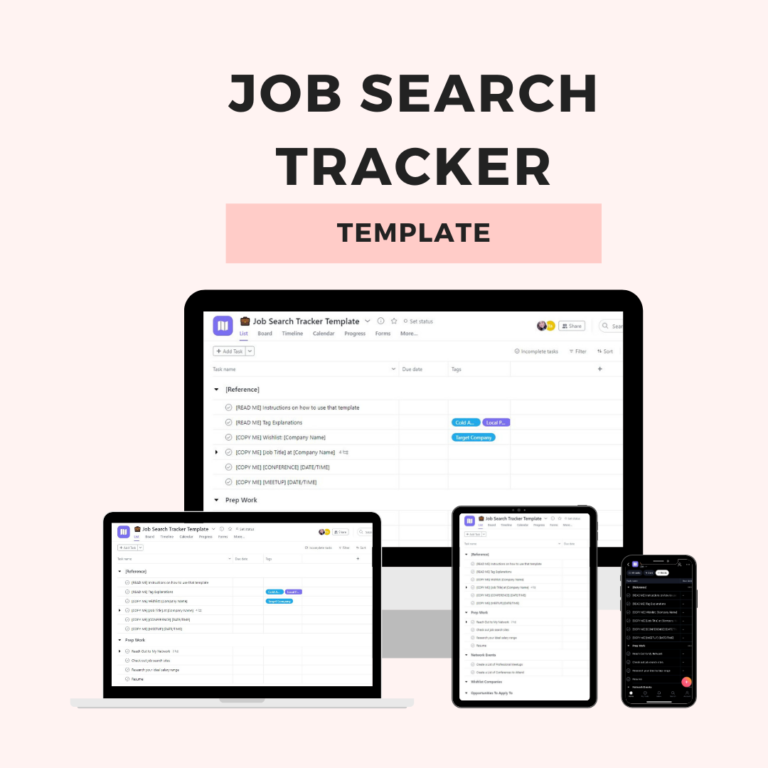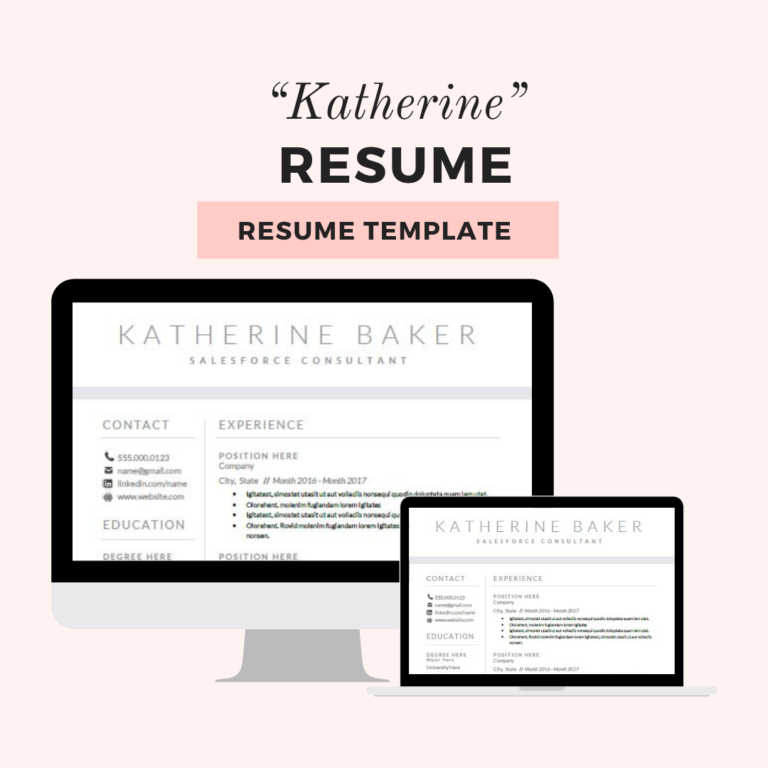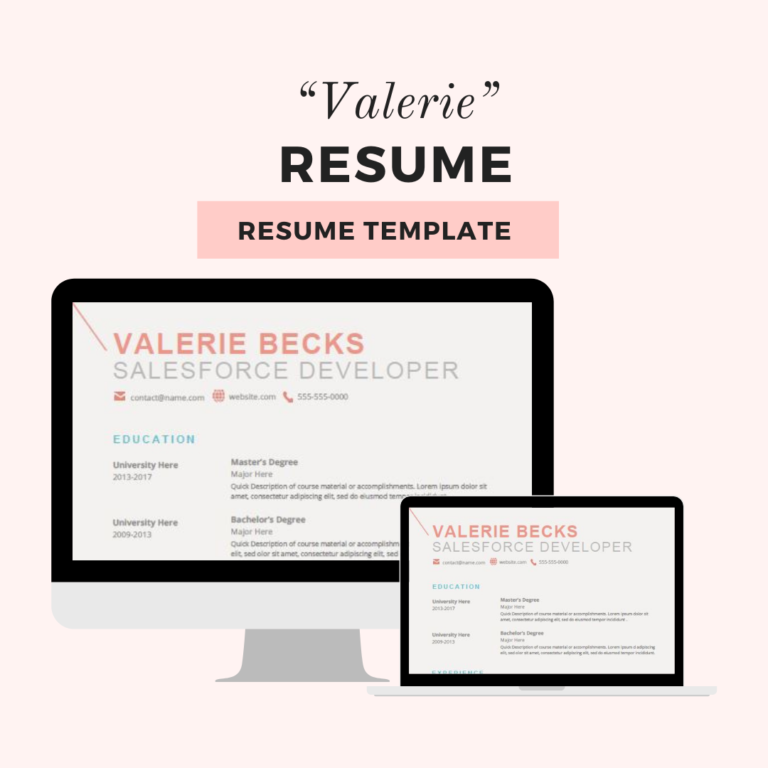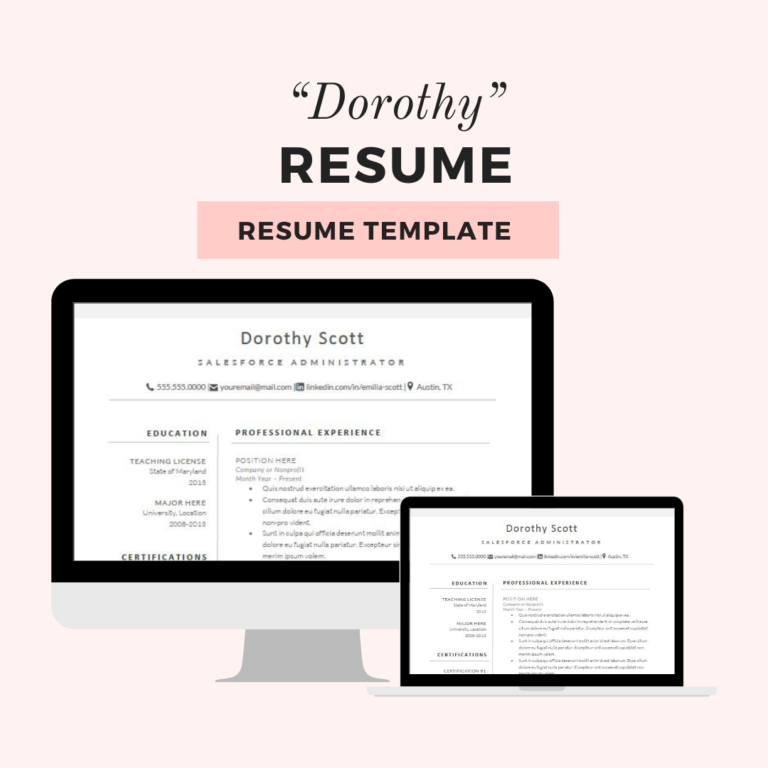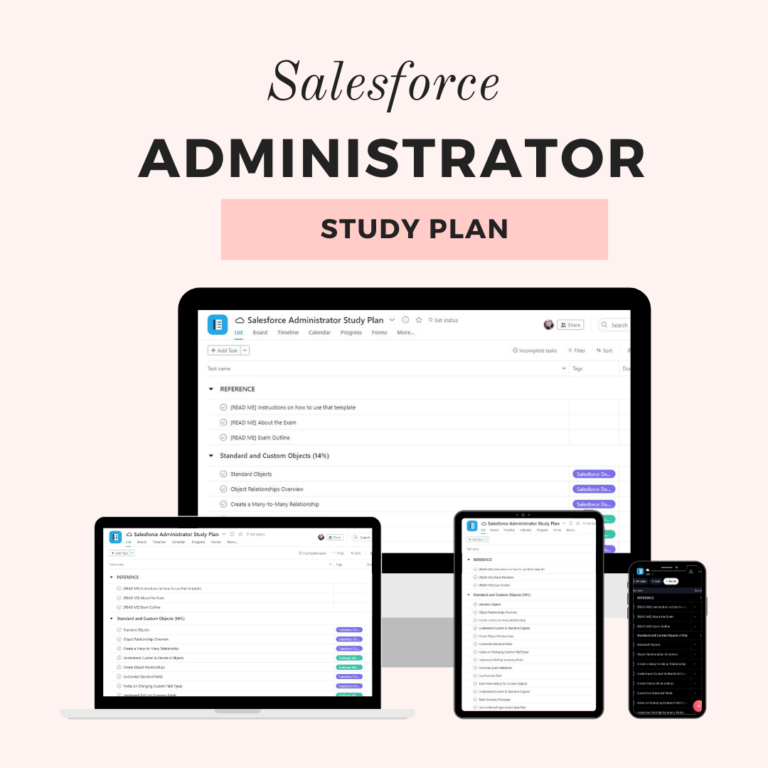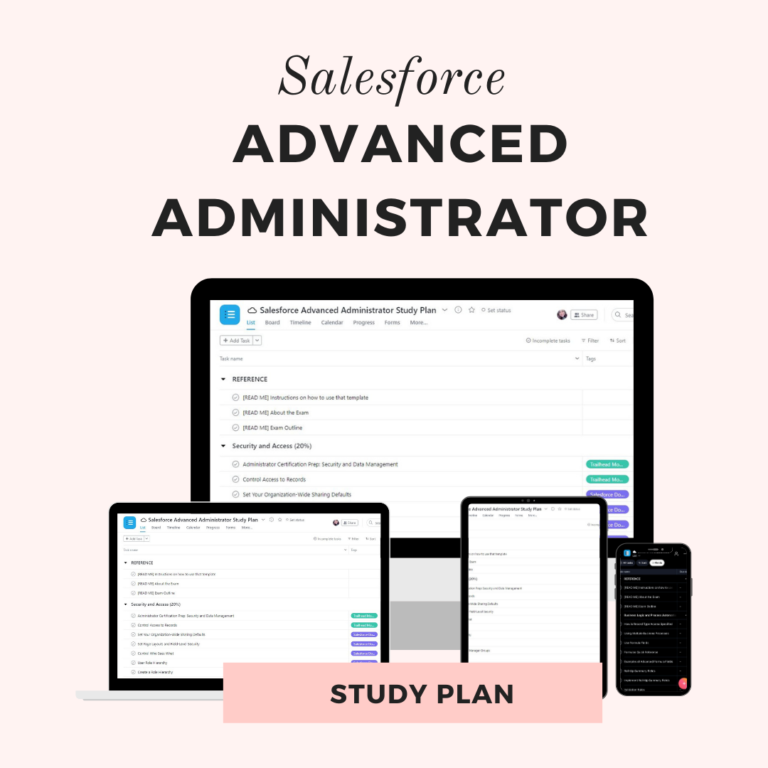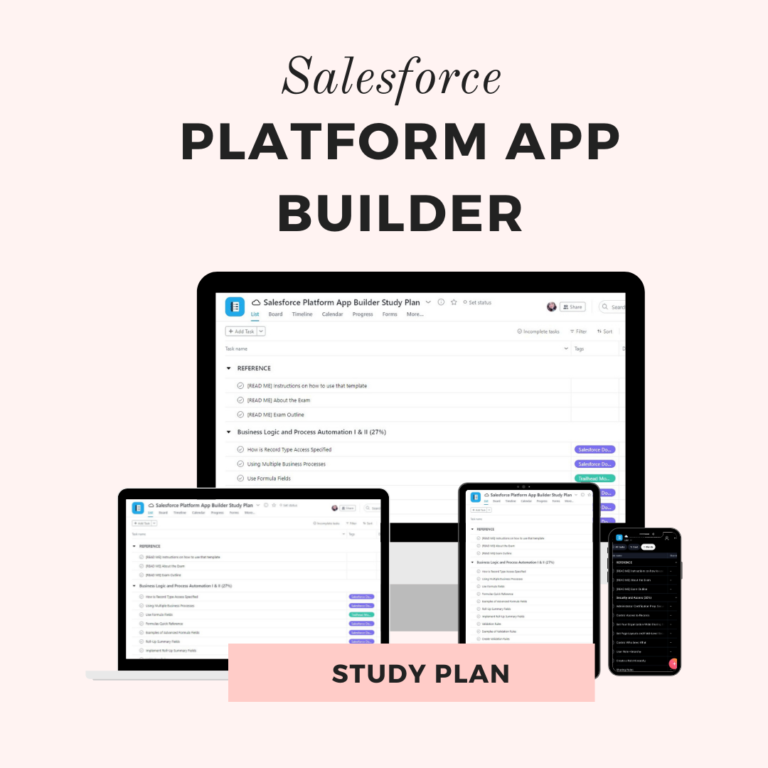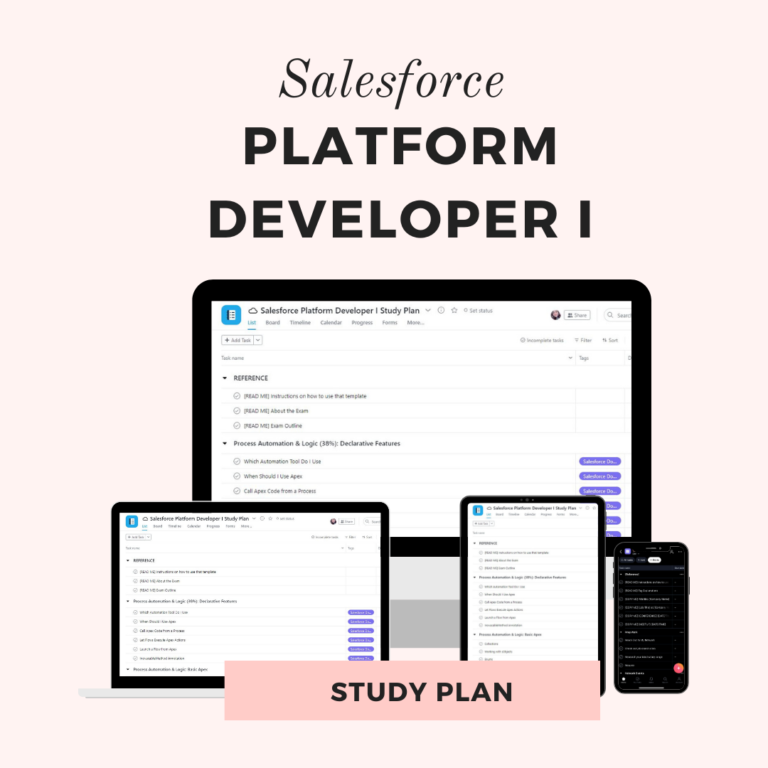THE FREE RESOURCE
Breaking Into the Salesforce Ecosystem: A Guide
DISCLAIMER
Lipstick and Tech has made a concerted effort to accurately represent a number of resources (both free and paid) that are both helpful to new professionals and which best align with the Lipstick and Tech brand. Please use discretion and vet products, resources, or services on your own. YOUR INDIVIDUAL RESULTS MAY VARY. While the earning potential for people who transition is very encouraging, you acknowledge that your earning potential is subject to many independent factors all of which vary from individual to individual and are often out of any individual’s control.
Lipstick and Tech cannot and will not offer any direct financial advice, nor are we responsible for any financial decisions that you make. It is your sole responsibility to discuss the legality or financial soundness of any decision you make with a qualified professional before making such a decision.
What is Salesforce and why are Salesforce professionals in demand?
Salesforce has become the go-to Customer Relationship Management (CRM) software around the world and is used by more than 150,000 businesses, such as Wal-Mart, United Healthcare Group, and Hershey’s Chocolate. Experts estimate that the Salesforce ecosystem will create a whopping $4.2 million in jobs by 2024. Last year, there were an incredible 48,000 new Salesforce Admin jobs created, showing the demand for this software and its professionals.
Salesforce’s appeal comes from its ability to be tailored to any company’s specific needs, so it is becoming increasingly popular for businesses of all sizes. It also allows companies to streamline their processes, making it a great asset for businesses.
What roles are available to newbies?
It is important for Salesforce professionals to have an understanding of what is typically expected in a job description, but it is also important to note that responsibilities and job roles can vary between different companies. Additionally, two professionals with the same job title can have completely different day-to-day experiences in different companies. To gain more insight into this topic, please refer to the blog post: “Here’s Why You Shouldn’t Sweat Over Salesforce Job Titles” by ForceWithLuke.
Salesforce admins are essential to the success of an organization, as they are the ones who can provide guidance and insight into the customizations of their Salesforce system. Depending on the size and type of the organization, these admins are often doing similar tasks that a help desk associate might do, such as creating snapshots, setting up dashboards, fixing errors and records, and managing users.
Salesforce Business Analysts (BAs) often share similar responsibilities to Salesforce Admins, depending on the organization’s structure. BAs serve as a liaison between departments, teams, and stakeholders to ensure the proper procedures are in place. Moreover, BAs are responsible for documenting and tracking any data, requests, results, and testing criteria that come from stakeholders.
A competent Salesforce developer should possess an aptitude for design, coding/development duties, familiarity with APIs and integrations, and the ability to create bespoke solutions with scalability in mind.
A Salesforce consultant is an expert in Salesforce and works to bring about positive change within an organization or for a particular project. They have a comprehensive understanding of business analysis, recognizing potential issues and using their change management expertise to plan, execute and sustain the outcome.
You’ll find the following link really helpful in identifying the roles, and responsibilities as well: “Different Types of Salesforce Roles, Explained” by Talent-Hub. SalesforceBen also has a helpful post: “Your Guide to Salesforce Roles & Responsibilities“.
Everyone Takes Their Own Path
Salesforce careers can be great for many. However, if you’ve never picked up a career book or spoken with a career coach, I would encourage you to take the time to put in the work first. There are many technologies, especially in cloud computing, that while you’re on the journey of niching, it’s essential to do the job. It is entirely up to you to decide what Salesforce careers have in store for you (even if they’re adjacent to the technology). Still, many come to the ecosystem are because there are many options for remote work, easy to create a path to 6-Figures in ~3 Years of Experience, no degrees necessary, and you’ll learn valuable and transferable skills. There are no salary guarantees (though evidence suggests it’s consistent), but depending on industry and continued efforts to negotiate, many would agree on a six-figure salary in a 3/4 year timeline, assuming your role changes.
Many are usually concerned about how long it takes, and to be frank, it can vary from 3 months to 2 years. The reality is that there is no guarantee. Education, experience, and a bit of luck are the main factors. From L&T’s experience has been 3-6 months of finding employment once they’ve been certified, but that alone is a personal anecdote. It took me a year to find work, but I was an IT associate with no certification, hunting out-of-state (which has other particular challenges).
Salesforce is quickly becoming one of the most sought-after cloud computing technologies, and its customer success platform is leading the charge. It’s now the world’s #1 CRM and is gaining more traction as one of the fastest-growing tech ecosystems.
With its comprehensive technical documentation and a connected administrative and developer community, Salesforce offers a wide range of career opportunities to those looking to make a career in cloud computing. With the right skills and resources, you can easily leverage the Salesforce ecosystem to build your own lucrative career with AI, robotics, and more.
Books
On my bookshelf
Check out my recommended career, Salesforce, productivity and inspiring story reads! Here are a few I love:
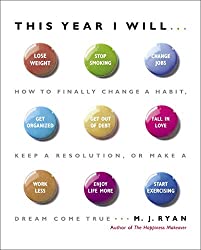
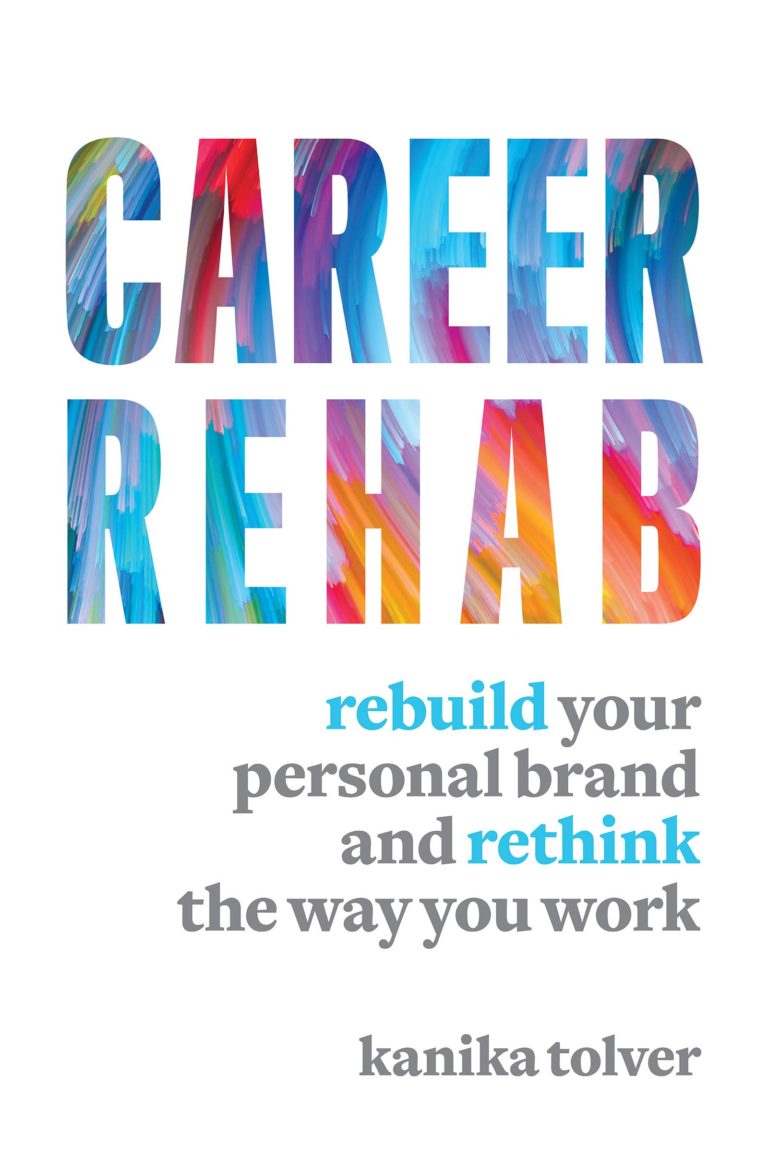
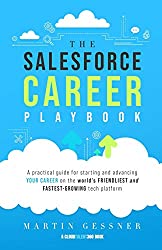
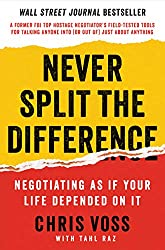
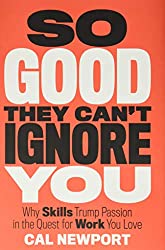
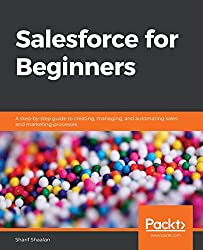
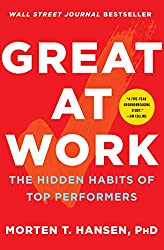
Learning Salesforce
While Salesforce is an extensive tool with many products, it’s also really easy to get started and get the basics. In an effort to get focused with your learning, it’s important that you’ve established a role you’re most interested in and narrow down your learning from there. There are many paths you can go, (as outlined by Trailhead here) but clarifying a certification path (even if you work towards one for now) can help narrow down the tech you need to know. Check this out for a visual: Salesforce Certification Pathways 2022 [Infographic].
SPECIFIC STUDY-MATERIALS
It may be difficult to start knowing where to go, but I personally believe you should make sure you take the time to understand your learning style before embarking on your learning journey. Salesforce exams do not test you on just definitions: for a tool that has many “answers”, they’re geared on you understanding why one solution could work over another based on a scenario. Here a few places to get started:
The best learning resource for you may not only depend on your learning style, but also your budget. That said, the best place to start is always Trailhead, Salesforce’s resource.
If you have not seen anything about Salesforce and how it works, this is the place to begin! Salesforce has its own FREE resource for learning everything Salesforce here. This is most people’s primary introduction to learning.
Looking for additional study materials? This is my favorite “unofficial” Salesforce resource. When I felt that others were a little too easy and needed something that was more reliability in updated information, this was an excellent place to go. Not to mention their study guides/practice exams (not free) in my personal opinion are one of the best in the market and are worth it.
This is another great studying resource! The admin version is free, but I definitely have found that their exam notes are helpful in getting concise with the general topics of the course. They provide PLENTY of resources and links to dive deeper into the contexts, projects to practice your assignments, and quite a few other things. At a similar price point to Focus on Force, definitely another great self-study too.
There's a large misconception that if you just get the Salesforce certification that you'll find a job immediately.
I’ll be blunt: the Salesforce certification isn’t going to be enough. And if you’re not certified, it’s even more challenging. More important than the certification for your job hunt, it’s more important that:
-
- You understand the responsibilities & impacts of the role you’re applying for
- You’ve established a career hunting strategy,
- Are equipped with the necessary communications (i.e. your “personal marketing materials”: a great resume and cover letter
- And a personal brand that helps you stand out in the job market
Prepping Your Job Materials
RESUMES
Crafting a resume is an essential part of the job hunting process. It’s important to take personal inventory of your skills and experiences first so you can effectively market yourself. Once you have a draft of your resume, review a job description and adjust your resume accordingly. It’s crucial to keep in mind the ATS (Applicant Tracking System) and AI (Artificial Intelligence) systems that recruiters use are refined by recruiters on the end of the day. Therefore, don’t just stuff keywords into your resume without substance and remember that a recruiter can tell when you’re trying to cheat the system. I would always encourage you to use word-processing tools that are ATS-friendly though to save yourself the trouble during the application process (Canva isn’t quite ATS-friendly). To get you started, here are a few:
- How to Write a Winning Resume: Resume Workbook by Career Center, Saint Mary’s College of California
- This Free Worksheet Makes It Easy to Create (or Update) Your Resume, theMuse
- 8 Things You Need To Know About Applicant Tracking Systems
- Fix Your Resume Mistakes Today & Get the Job Tomorrow!
- 45 Quick Changes That Help Your Resume Get Noticed
- Create a Winning Resume Webinar Exclusive replay to the email list! *Unedited
- JobScan (if you have a job description in mind and want some help from a bot!) Protip: going in incognito, clearing your cache, not logging in could easily bypass your limit on scans
- Lipstick and Tech Resume Templates- Includes a Resume Checklist bonus
cover letters
A cover letter is an important tool for job seekers to highlight their skills, experience, and interest in a new role or company. It is a one-page document that should include contact information, a greeting, an introduction, a body, and a call-to-action. While cover letters are becoming less and less common in the tech industry, they are still recommended in certain situations, such as when requested, when it is your dream job or company, when transitioning from a different industry, or when you have a unique and compelling story to tell. For additional help with writing a cover letter, here are some helpful resources:
LINKEDIN PROFILEs
LinkedIn is an invaluable tool in the job search process. Not only can you apply to jobs directly, but you can also use it to research recruiters and decision-makers and gain insight into what those in your desired profession do. It’s essential to ensure that your LinkedIn profile is up-to-date, comprehensive, and easy to read. For those in Salesforce, it’s helpful to list “Salesforce.com” in the Skills section, have Salesforce-related keywords in the headline, and make sure you add your Salesforce admin certification on your profile as soon as you get it (if you don’t yet, make sure to get it soon!).
- How to Use Your LinkedIn Profile as a Resume
- LinkedIn Student Profile Checklist, Texas Tech University
- LinkedIn Profile Checklist, Stanford
- How to Maximise Your LinkedIn Profile for Salesforce Roles, Lisa Kindeland on LinkedIn
- Top 8 LinkedIn Profile Tips From Salesforce Experts, CloudTalent360
- 99 LinkedIn Profile Tips: from Summary & Headline to Images, Zety
- Highlight Your Salesforce Skills On Your LinkedIn Profile, WeLearnSalesforce
Job Hunting
When searching for a job, having a career plan is essential for staying motivated and focused on your goals. To create an effective plan, consider taking a look at any old performance reviews you have, setting achievable goals with specific timelines, and even considering job shadowing or internships to gain more experience. You can also use journals and prompts to help you achieve your goals. Additionally, creating a checklist for all of your action items and preparing for interviews and negotiations with a plan will help ensure your success. For Salesforce professionals, joining Trailhead Communities, participating in community events, requesting referrals, and utilizing job boards such as LinkedIn, Google Jobs, Glassdoor, AngelList, DiversifyTech, BlackTechPipeline, and Mason Frank are great resources.
-
- Step-By-Step Guide to Setting Career Goals, The Balance Careers
- Organizing My Job Search with Asana | How I Stay Organized During My Job Hunt [YouTube video]
- Job Searching During COVID – Navigating the Job Market & Finding a Job During An Economic Crisis [YouTube video]
- 5 Simple Steps to Create a Personal Brand, SalesforceBen
- How to Build Your Personal Brand And Get Ahead, Salesforce
- How To Develop Your Salesforce Personal Brand, CloudTalent360
- Explore Personal Branding & the Salesforce Enablement Manager Career Path [YouTube video]
- Interview Strategies, Trailhead
- Top Trailhead Badges to Earn in 2022, SalesforceBen
- Why You Need Trailhead Badges To Get Your Next Salesforce Job, Will Lutz on LinkedIn
- 12 Job Searching Strategies That Work, Indeed
- 15 Job Search Strategies That Work, Forbes
- Top Strategies for a Successful Job Search, TheBalanceCareers
- How To Find a Job After Long-Term Unemployment, Indeed
- Template Interview Guide, SHRM Education Programs
- Some Strategies for Developing Interview Guides – Harvard
- The Ultimate Interview Guide: 30 Prep Tips for Job Interview Success, TheMuse
Spotlight
NONPROFITS THAT ROCK
CAREER CREATORS THAT ROCK
FIND THIS HELPFUL?
Please support Lipstick and Tech!
share & refer
I hope for those strapped for cash, this will serve as a valuable resource. Please share this with your peers and if you can refer L&T, I’d be grateful!
SHOP
In addition to the career services L&T offers, I also offer cute merch, resume templates, and more at the shop! Thank you in advance for your business!
ABOUT THE AUTHOR
I'm Kim, Your Salesforce Career Strategist
As a Salesforce Business Analyst and Consultant, I’m passionate about helping entry to mid-level tech professionals get into the tech industry by assisting them in launching or transitioning to a Salesforce career. I understand the amazing opportunities that Salesforce provides, allowing me to do work I love while earning a competitive six-figure salary. I’ve been able to make this journey myself and I’m committed to helping others do the same. The market salaries of new professionals are evidence that Salesforce offers great potential to increase your career mobility and income.

Looking for a self-paced guide to becoming a Salesforce Admin?
That's why I created Salesforce Admin Jumpstart.
A career development course designed to help you break into tech and land your first Salesforce Admin Job!
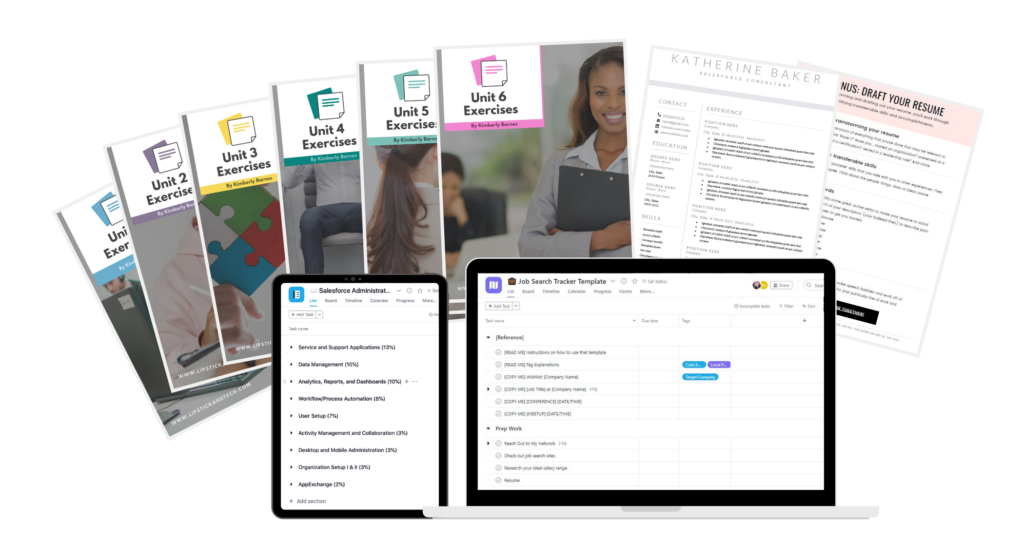
Inside, you’ll learn:
- What you need to know about getting your first Salesforce Admin job
- How to create a study plan and get your Salesforce Admin Certification
- How to package your existing experience and skills to attract recruiters
- How to find entry-level admin jobs where you can earn more and learn on the job
- What to say in the interview so you can land your first Salesforce Admin job
